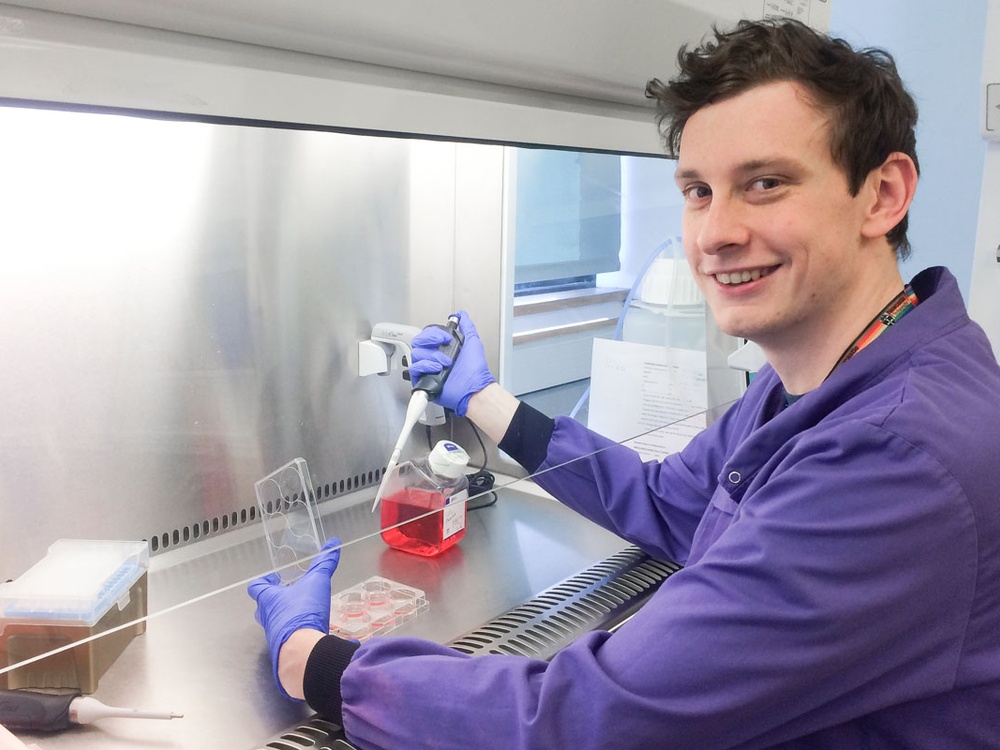Can you tell us a bit about your research project?
My research project involves trying to identify novel drugs that can improve mitochondrial function in cells grown in the lab, including brain cells, that contain faulty mitochondria. If we can show that these drugs work in cell culture models, they could potentially be used to improve mitochondrial function in the cells of those affected by mitochondrial disease. The hope is that eventually this could lead to an improvement in symptoms often seen in patients. This is important as there is currently no cure for mitochondrial disease.
How do you prepare and grow brain cells in the lab?
We have a unique collection of patient samples in the Wellcome Centre that make up the Mitochondrial Biobank. As researchers, we can access these to ensure our preclinical research is performed using the most relevant models of mitochondrial disease. For my research project, I use stem cells that have been made from skin cells donated by patients. I can manipulate these stem cells and change them into any type of human cell, such as brain cells. It takes around 3 weeks for this to happen, and during this time I need to make sure the cells are well looked after so I check them every day.
What do you use these brain cells for?
Once I have grown the brain cells in a dish, I can use them to test potential drugs that may improve mitochondrial function and lead to a benefit in the overall health of the cell. I add different amounts of the drug to the dish and after a few days, look at the mitochondria within the cells using a coloured dye that labels the mitochondria. The cells can be imaged using a fluorescent microscope, which allows the labelled mitochondria to be seen.
Why is it important to use brain cells?
Mitochondrial disease can affect any part of the body, but it is mostly organs or tissues with high energy demands that are involved. The brain itself needs a lot of energy to work, so when the mitochondria are damaged and can’t make enough energy, the brain is often affected. It is important to test potential treatments in cell culture models that are most relevant to patients with mitochondrial disease, as this will help us identify new drugs that could improve mitochondrial function in the cells or tissues where they are needed most. By using stem cells that can be turned into any cell of the body, including brain cells, muscle cells and heart cells, we hope this kind of preclinical research will lead to future drug trials for patients.
How did you get involved in this area of research?
I’ve always been interested in biology and always want to find out new things, so I naturally drifted into research. I first became interested in potential treatments for mitochondrial disease during my BSc in Pharmacology at Newcastle University, and followed this with a research project in the Wellcome Centre for Mitochondrial Research as part of an MRes in Neuroscience. I was given the opportunity to continue this research with a PhD in the Wellcome Centre, and I am now in my final year.
What do you enjoy most about your research?
The problem-solving aspect, as I love finding answers to questions and working to achieve them. Sometimes in research you feel there are more questions than answers, and that finding the answer to one question leads to many more questions, but I enjoy a challenge! We also have a great team in the Wellcome Centre who meet regularly to share ideas and help each other with different aspects of our research. It’s also very rewarding to feel I am contributing in some way to improving the lives of those affected by mitochondrial disease and this keeps me motivated.
What would you say to anyone thinking about a research career?
Without wanting to sound overly eager, I would say to anyone who is considering a career in research, just do it! I believe having a passion for your chosen area of research is very important, as this will keep driving you no matter what is happening with your experiments in the lab (both good and bad!). It’s also important to have a good team around you who will help and support your development as a researcher.
Find out more about Brain Awareness Week.
Find out more about British Science Week.

